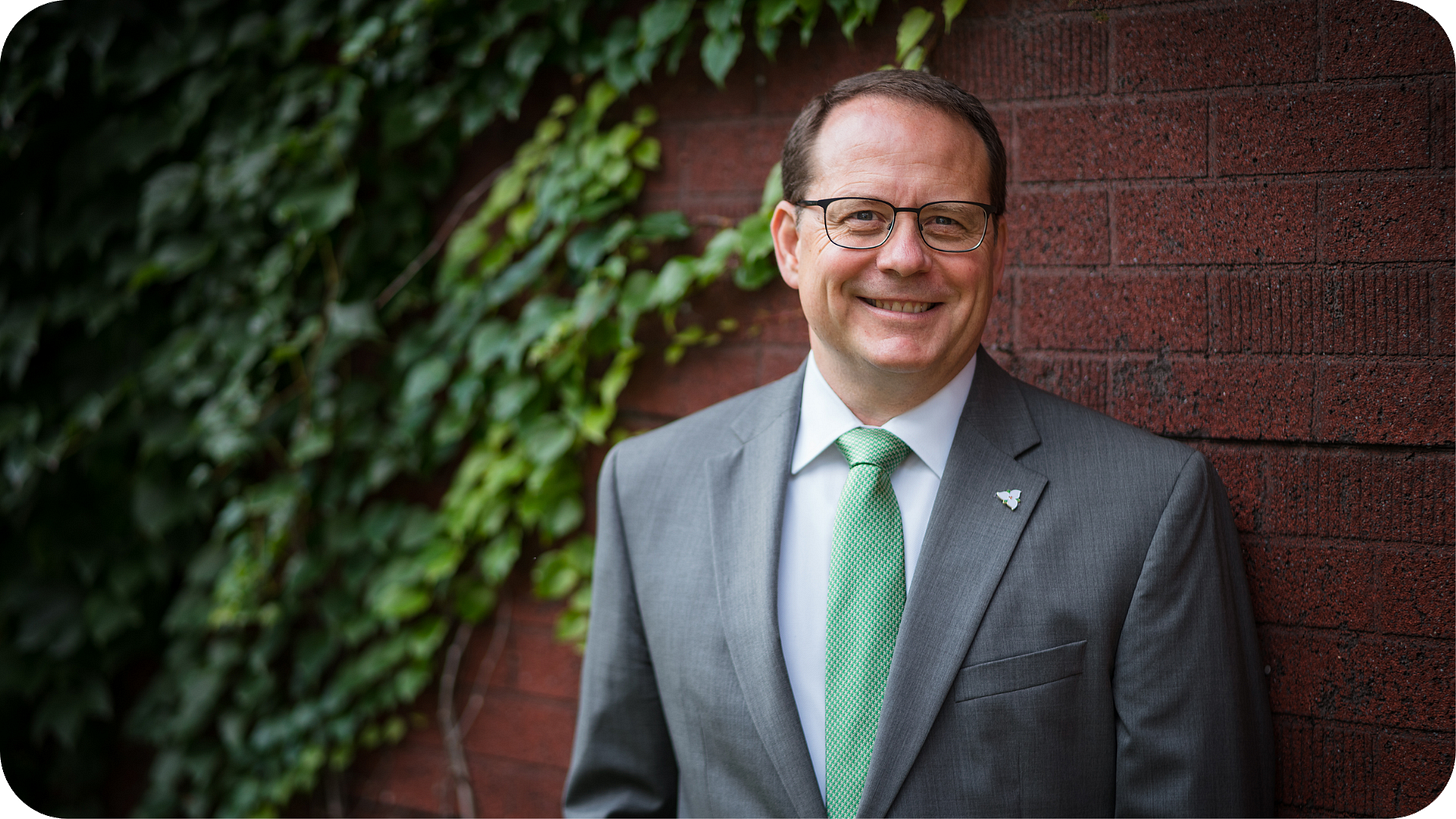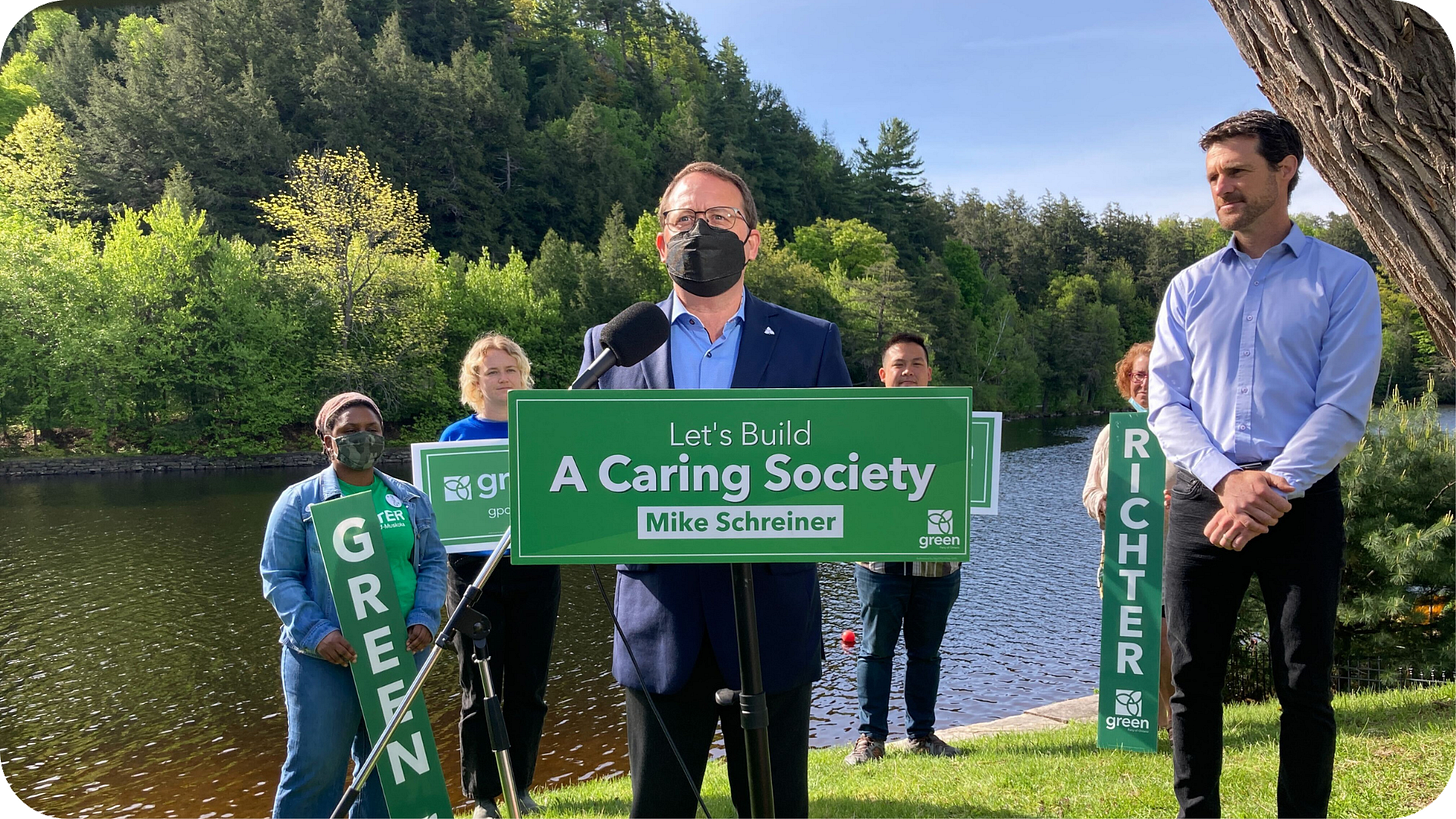Schreiner on expanding his caucus and 'offering new solutions to old problems'
One-on-one with Green Party leader Mike Schreiner
Happy Tuesday. Welcome to a special edition of POLICORNER — your insider’s guide to Canadian politics, policy and power.
In this 9 minute read, he made history in the last election and now he’s on a mission to expand his caucus at Queen’s Park. Green Party leader Mike Schreiner sits down with newsBeyond to discuss his priorities and his final pitch to voters.
THE LEDE
“Offering new solutions to old problems that the three old-line parties have failed to address.” That is what this campaign has been about for Mike Schreiner.
Schreiner was born in Kansas — growing up on the family grain. He moved to Canada with his wife in the early 1990s, owning a small business and launching multiple initiatives to “connect sustainable farmers with Ontario households.”
The longtime leader has spent the past four years as the lone — and first — Green at Queen’s Park. He is widely respected at the Legislature — earning a rare bipartisan shout-out from Progressive Conservative leader Doug Ford during the province-wide leaders’ debate. “I can work with Mr. Schreiner,” Ford said of his relationship with the Green captain.
The party made history in the last election after winning a seat in Guelph — what was considered a stronghold Liberal riding. “I think people have seen the tremendous influence we’ve had at Queen’s Park,” he explained.
Schreiner — in his thirteenth year as leader — is now seeking to expand his caucus size on Thursday night with fresh polling indicating that the party is on the verge of a win in Parry Sound—Muskoka.
Schreiner sat down with newsBeyond days before the campaign kickoff to discuss his priorities and what the Green Party has to offer for voters.
The interview has been edited for length and clarity.

What would you like average voters to know about you and your background?
“I'm a longtime small business owner who deeply believes in being honest with people about the challenges we face and the solutions that's required to address those challenges and how we're going to pay for it.”
How is it different from the last election?
“We made history in the last election by electing the first Green MPP in the province. I think people have seen the tremendous influence we’ve had at Queen’s Park. Most observers say that we punched well above our weight. I'm saying to Ontarians that we've accomplished so much with one Green MPP. Imagine what a caucus of Green MPPs can deliver to improve people's lives.”
You are on track to winning your seat in Guelph. You are looking at securing a second seat. What would a bigger caucus mean for policy at Queen's Park?
“I think it would ensure that Greens continue to be able to maximize our influence to deliver real solutions to old problems that will improve people's lives. A lot of observers have said that we have had an outsized influence at Queen's Park. Having additional Green MPPs will only enable us to drive that policy agenda forward. So many people want a political party — like the Greens — that puts people before politics and doesn't engage in the toxic, hyper, partisan, negative politics that you often see with the other parties. They want a party that's going to get things done and improve their lives.”
There is a perception that your party is an environment-only party. How do you move beyond that perception and make yourself known with a platform that goes beyond environmental policy?
“I think we’ve been very effective by leading on a number of issues at Queen's Park. I speak on every bill before the Legislature. We’ve got strong policy positions on a wide range of issues.
We've been leading the charge in addressing the housing affordability crisis. Media outlets have described our plan as a masterclass plan in delivering solutions. We were the first party to put forward a standalone mental health plan. I would argue that so many of the challenges we face moving forward are going to be driven by the climate crisis. For example, the World Health Organization says the number one threat to human health outside of the immediate threat of the pandemic is the climate crisis. The biggest driver to people's home insurance rates going up is the climate crisis. The climate crisis affects all parts of our lives. The Greens are leading the way in positioning Ontario to have a prosperous sustainable economy by putting the policy framework for us to be a global leader in the new climate economy in place.”
What would be the priorities for a Schreiner government in the first 100 days?
“To tackle the housing affordability crisis. To make sure mental health services are accessible and affordable to people. To build capacity and our public services — particularly health care, education and social services. To put in place the policy framework for Ontario to be a leader in the new climate economy.”
Would you support a Progressive Conservative minority government?
“I won't support a Doug Ford government because he is dismantling all climate action plans in Ontario and has systematically been dismantling the environmental protections that protect the places we love, the farmland that feeds us and the wetlands that reduce flood risk.
Would you be open to negotiating with them?
“They would have to do a complete and radical change in the policy direction that they're pursuing right now. I can't imagine that happening.”
You are promising to expand access to mental health and addiction care under OHIP. The cost of this plan would be $6.6 billion over four years. Where will the money come from?
“I'll just be very clear — we would reverse Doug Ford's license sticker gimmick. That is the funding that is necessary to be able to fund our mental health plan. One of the things that makes me proud of the Green Party is that we're very honest with people about how we will pay for things. It was interesting that the NDP released a mental health strategy about a month and a half after we did. I'm happy to say another party followed our lead and copied much of what was in our mental health plan but they didn't release any funding. They didn't tell you how they were going to pay for it. To me, it is just irresponsible for parties to put forward these kinds of promises and not tell you how they’re going to pay for it.”
Can you speak more about what your affordability action plan entails?
“I think there are three critical components to addressing the housing affordability crisis. One is tax policies that drive the rampant speculation out of our housing market — part of what is driving up housing costs to completely unaffordable levels. The second is to increase housing supply by working with the private sector on zoning changes to create more housing choices for people. The third key component is to have the government involved and putting money on the table to work with co-op, social and nonprofit housing providers to make sure that we provide housing, especially purpose-built rental housing, that is affordable for people in the communities they want to live and work in.”
How are you going to lower the price of gas?
“We are going to get gas out of people’s lives by making electric vehicles more affordable for them. You can fill up an electric car for five bucks while others are paying 100 bucks at the gas pumps. Let’s just get Big Oil out of our lives. We've seen throughout history that the price of the pumps is mostly driven by geopolitical events. The faster we can get Ontarians off of Big Oil and have them purchase made-in-Ontario low-cost electricity to fill their vehicle up, the faster we can help people save money.”

Is balancing the budget going to be a priority for a Schreiner government?
“First of all, I don't think now is the right time for austerity. I think we need to emerge from the pandemic, making investments and strengthening funding for our public services. Where our belief in fiscal responsibility comes in is to be honest with people about how to pay for it.
We are honest with people about the fact that we would reverse Ford's license plate gimmick because those are billions of dollars that we need to invest in health care, education and improving mental health services. We’ll present a pathway to balance — how fast we get to a balanced budget will primarily be determined by what the fiscal situation the province is in.”
You talk a lot about the three establishment parties. What do you say to voters who don’t trust these parties? What makes you any different or more trustworthy?
“I think we've made a steadfast commitment. We've backed it up in our actions to put people before politics and to make decisions based on evidence and to be really honest and forthright with people about what we would do and how we would pay for it. I think people are tired of political spin or politicians not directly answering questions. We'll just be straight up with people. If you like it, hopefully you'll vote for us. If you don't, well then you'll probably explore somebody else. But at least we're going to be honest with you.”
There's a lot of talk about strategic voting. Some will say that a vote for the Green Party will split the progressive vote and will help the Progressive Conservatives. Make the case that a Green vote is not a vote for Doug Ford.
“If you're tired of the status quo parties not delivering the solutions you want and building the kind of Ontario you want to live in, we're never going to get that Ontario if you don't start voting for what you want instead of against what you're opposed to. I'm personally tired of settling for half measures when I want real solutions. That's what the Ontario Greens are presenting.”
What is your message to those who are still on the fence about who to vote for?
“If you want a party that's going to offer real solutions to build the kind of Ontario you want to live in — to address the housing affordability crisis, expand mental health services and make Ontario a prosperous and global leader in the new climate economy — the Green Party of Ontario is your best bet to making your vote count to deliver the Ontario you want.



